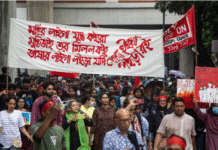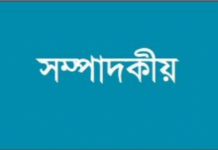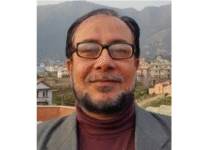
After the recent Al Jazeera sensational exposé, the question making the circuits now is, “whose ‘men’ are they?” There was that book and movie on US President Nixon’s Watergate scandal, ‘All the President’s Men.’ And Al Jazeera named their documentary on those lines, ‘All the Prime Minister’s Men.’
More than ‘what’ the Al Jazeera report has said, much of the discussions on the issue revolves around ‘who’ said the things that were said. Netizens of the ruling party ilk have added to their Facebook profile pictures the words, ‘We all are Sheikh Hasina’s Men.’ Whose men they are or whose man anyone wants to be, is an absolutely personal matter. But there are many men lurking around whose identities need to be revealed in the interests of the nation. For example, the most notorious name in the banking and financial sector at the moment is PK Haldar. It is hard to believe that he singlehandedly took control of four financial institutions, misappropriated Tk 35 billion (Tk 3,500 crore) and fled from the country. PK Haldar managed to do this because he was the ‘man’ of someone or the other. And he made someone or the other his ‘man’.
Rashedul Haque, the former managing director of International Leasing, one of the financial institutions taken over by PK Haldar, in his deposition made in court on 2 February, said that it was the task of former Bangladesh bank deputy governor SK Sur Chowdhury to ‘manage’ all of PK Haldar’s underhand dealings. Bangladesh Bank’s department of financial institutions and markets is tasked with overseeing the financial institutions in the country. Shah Alam has been in charge of this department as executive director for the past seven years. He was paid Tk 200,000 in bribes every month, though another person in this sector said that this amount was actually Tk 1 million. He would get this amount every month from various financial institutions. It was clear from the deposition that SK Sur Chowdhury and Shah Alam were PK Haldar’s ‘men’ in Bangladesh Bank.
The question is, if the manipulations of these Bangladesh Bank officials were an open secret, why was no action taken? We may refer here to an excerpt from an interview of former Bangladesh Bank deputy governor Khandakar Ibrahim Khaled published in Prothom Alo on 4 September last year. He has said that the government appoints the governor and deputy governor of the central bank. These appointments should be made with utmost care and careful consideration of the top most level of government. Now we hear that they are selected by a few business groups. If you go to Bangladesh Bank and inquire after a deputy governor, they will ask which one — the one of this group or that group? This is very unfortunate.
This matter applies to the managing directors of various state-owned banks too. It is an open secret now as to which group the Bangladesh Bank deputy governors or the state-owned banks’ managing directors belong, which business group lobbies for them and who they serve.
Shahid Islam had to pay a fat sum of money to remove the candidate from the contest, to control the votes and to appease persons in Awami League’s central election committee. Incidentally, the prime minister’s political advisor HT Imam was the co-chairman of the election committee
So whose ‘man’ is PK Haldar? And where did he learn how to buy shares from the share market and take control of banks and financial institutions? We can recall the changing of Islami Bank’s ownership in 2017. Shares were bought from the share market in the name of seven companies and then the ownership of Islami Bank was changed. At a closed-door meeting held on 5 January 2017 in Radisson Hotel of the capital city, the bank’s chairman, vice chairman and managing director were made to resign. S Alam Group played a role in buying new shares from the market and bringing about these changes. There were stronger persons and groups behind the scene. After that there were several other instances of banks and financial institutions being taken over. Many may be aware that the S Alam Group owned the two financial institutions of which PK Haldar became MD. So whose ‘man’ is this business group?
Another piece of sensational news in recent times was about the scam of the Shahid Islam-Selina Islam couple. A Kuwait Court has sentenced Shahid Islam to four years imprisonment and a Tk 531,962,000 (Tk 53 crore 19 lakh 62 thousand) fine. He had become member of parliament simply by dint of money and even used his wealth to make his wife an MP. In the 2018 election, this seat was left for Awami League mahajote (‘grand alliance’) ally Jatiya Party (JP) and Mohammad Noman as given nomination. Shahid Islam was an independent candidate. Then the JP candidate moved away from the fray and Awami League didn’t put up any candidate in his stead either. In fact, Awami League central election committee sent instructions to the local party men to lend their support to independent Shahid Islam. It is alleged that Mohammad Noman was paid Tk 120 million (Tk 12 crore) to step aside. He was Shahid Islam’s ‘man’.
A report appearing in Prothom Alo on 24 June last year stated that Shahid Islam had to pay a fat sum of money to remove the candidate from the contest, to control the votes and to appease persons in Awami League’s central election committee. Incidentally, the prime minister’s political advisor HT Imam was the co-chairman of the election committee. So the question then is, whose man was Shahid Islam? And whose ‘man’ or ‘men’ manipulated the entire move?
Another question that has loomed large over the banking sector for quite some years now is, whose man is Abdul Hai alias Bachchu, the former chairman of BASIC Bank? He remains safe and sound even after misappropriating Tk 35 billion (Tk 3500 crore) from the bank. Over the past 10 years, the Anti-Corruption Commission could find nothing against him. Yet the former finance minister AMA Muhith on 22 February 2016 had said in parliament that Abdul Hai Bachchu had been involved in corruption related to loans, appointments and promotions. The parliamentary standing committee on the finance ministry also found Abdul Hai’s complicity with such matters. So why has no action been taken against him? The former finance minister had an answer to this too on 30 June 2016 in parliament. Speaking about the Hall-Mark and the BASIC Bank scams, he said that our own party people obstruct these frauds from being caught. He did not elaborate who within the party had created the obstruction. But it was clear that Abdul Hai was also someone or the other’s ‘man’.
It would be so good if these people too added to their Facebook profiles, whose ‘men’ they actually were.
Shawkat Hossain is special news editor of Prothom Alo and can be contacted at shawkat.massum@prothomalo.com.
This column appeared in the print and online edition of Prothom Alo and has been rewritten for the English edition by Ayesha Kabir









